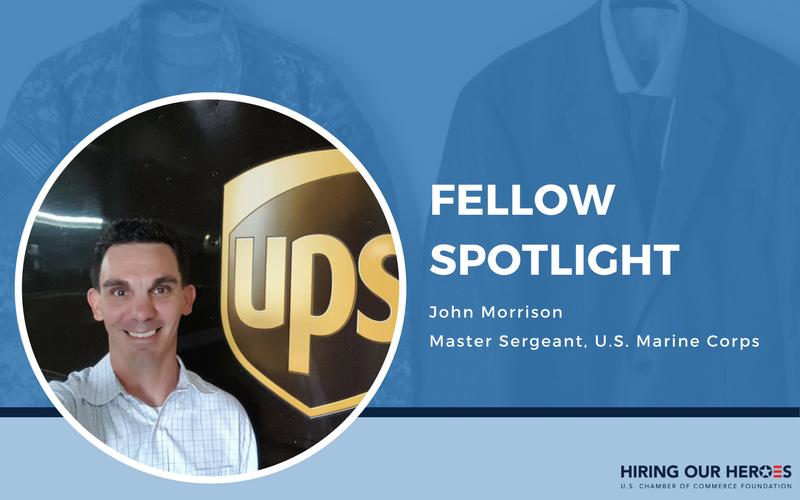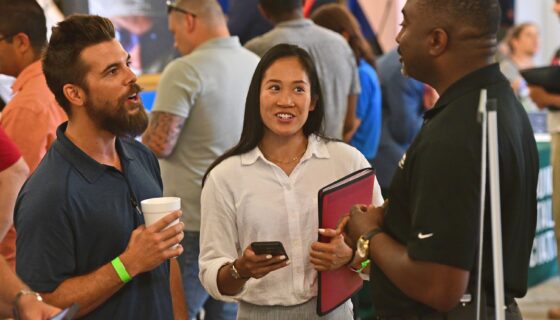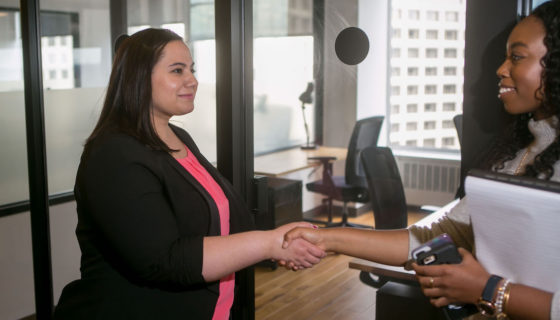Corporate Fellowship Spotlight: John Morrison

Editor’s note: Hiring Our Heroes funnels the immense employment potential of transitioning service members into veteran-ready employers through the Hiring Our Heroes Corporate Fellowship Program. Working at more than a dozen program sites across the nation, transitioning military service members have the opportunity to gain hands-on experience in the civilian workplace through an on-the-job fellowship with businesses of all sizes. The Corporate Fellowship Program matches candidates with participating companies, giving service members behind-the-scenes insight into how some of America’s biggest and best organizations operate, and at the same time connecting employers with top veteran talent.
The Fellow Spotlight introduces a fellow who has recently graduated from the program.
Meet Hiring Our Heroes Corporate Fellow John Morrison
Master Sergeant, U.S. Marine Corps
Military Occupational Specialty: Logistics Chief
Current Employer: Innovative Reasoning LLC
Why did you choose to apply for the Corporate Fellowship Program?
I learned about the Corporate Fellowship Program during a brief delivered to my Transition Assistance Class. I noticed that there was an array of companies that participated, ranging from Fortune 500 companies to smaller startup companies. The list of participating companies piqued my interest that I may be able to job-shadow in a company such as General Motors or UPS, which would then hopefully turn in to a job offer at the completion of the program.
What was your experience while working and training with your corporate partner?
I had the pleasure of working as a “UPS’er”, a title that is given to every employee within UPS. Due to the large size of the organization, UPS has many different roles and responsibilities that reside within the company. The objective of UPS’s program was to expose us to as many different functional areas as possible during the 12-week program.
I was first exposed to the small package operations and learned how parcels are organized, dispatched, and delivered. I actually went to UPS’s driver “boot camp” where new service providers are trained and tested against metrics that continually allow them to set industry standards for package delivery. Prior to attending that course, though, I spent a day with a driver, wearing the same uniform and making deliveries! For a day I was that UPS’er who was delivering on a promise that was made when the shipper turned the package over to UPS. For me, the marquee week was when I was given the opportunity to shadow UPS’s public Affairs team in Washington D.C. I spent the morning at an international trade summit where I had lunch with James Sullivan, the Deputy Assistant Secretary for Services, and Laura Lane, the President of UPS’s Global Public Affairs Division. The afternoon was spent lobbying support from multiple U.S. Representatives at the Rayburn Building and I ended the day with a visit to the UPS Townhouse. Less than 12 hours later, I was on the TARMAC at Baltimore Washington International, sitting in the cockpit of a UPS Boeing 767 that had just delivered packages from Louisville, Kentucky, discussing the intricacies of UPS’s air operations.
I had an absolute blast in every aspect! As a military logistician, this opportunity was second to none. This was a chance for me to see if I liked working for UPS and if I could prove my potential worth to UPS as a UPS’er as well.
What difference did the Corporate Fellowship Program make in your transition process?
The Corporate Fellowship Program helped ease my fear of not finding a job. Even more than that, the Corporate Fellowship gave me an opportunity to grow my network exponentially, as well as reinforced the belief that my leadership abilities transcend the uniformed services.
The fellowship program has an 80% job placement rate for fellows upon completion, so when I received the list of companies that I was scheduled to interview with, I knew that I wanted to be a fellow with UPS. When I was offered the fellowship with UPS I was ecstatic, because I knew that meant I had an excellent opportunity to earn myself a position within the company.
What does it mean to have companies that are willing to invest in transitioning service members?
These companies that are willing to take on service members understand the value that we, as uniformed service members, can bring to their company. As service members we are given immense amounts of responsibility from a very young age. Those responsibilities range from maintaining multi-million-dollar pieces of equipment without supervision to leading patrols into combat.
These companies intrinsically understand the amount of pressure that is placed into our hands and know the value that we can bring to their companies with the soft skills that become innate over a service member’s time in the military. These soft skills, such as decision making, leadership, and work ethic, are all skills that can transfer to any occupation.
What personal and professional discoveries did you have while studying as a fellow?
With regard to personal discoveries, I rediscovered my passion for getting into the trenches with the operators on the front line. What I am saying is that I got so used to working as a manager/supervisor in the latter part of my career, that I had forgotten how much I enjoyed doing some of the “heavy lifting,” so to speak.
Professionally, I learned that synergy, team work, and leadership in the civilian workforce are very similar to the same methods that I have used throughout my career in the Marine Corps.
What is the biggest benefit of participating in the Corporate Fellowship Program?
The biggest benefit that I gained from this program was the opportunity to learn from different companies about the hiring process, interview process, and resume tips and tricks. Most of those topics are covered during the mandated transition assistance class, but the fellowship gave me the opportunity to see these topics covered by hiring professionals.
What should other transitioning service members know about the Corporate Fellowship Program?
Coming into the Fellowship, I was used to a rigid schedule. When you come into the fellowship, depending on the host company, your schedule may vary from day to day, or week to week. Every fellow’s experience is going to be unique, but if you give the program and your host company 110% effort, you are going to come out of the program with an informed understanding of how the corporate civilian workforce operates, regardless of whether the program ends with a job offer.



